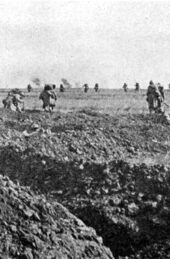The Gallipoli campaign was originally conceived as a naval operation that could be carried out without the use of troops, to clear the costal fortifications barring the Dardanelles Straits. The plan was to gradually reduce the Turkish defences through a systematic bombardment. The way to Russia’s warm water ports, Constantinople (Istanbul) and the backdoor the central powers would then be opened.
The naval bombardment began on the 19th February 1915, the Turkish forts at the entrance to the Straits were destroyed according to plan; but when the Allied fleet tried to clear the defences inside the Dardanelles Straits, things began to unravel.
The Allied fleet were able to suppress the guns defending the Straits for a short time, but the guns could only be destroyed by a direct hit and the fleet was unable to get close enough to finish them off because they were protected by minefields. The clapped out fishing trawlers used as minesweepers were unable clear the minefields because they were protected by batteries of hidden field guns and howitzers. These batteries were extremely hard to find and, when they were the Turks moved them. The Turkish gunners also used decoy batteries of drainpipes that released black smoke every time the main batteries fired.
The naval campaign reached its peak on the 18th March 1915, following intelligence reports that the Turks were running out of shells. The Allied fleet made an all out attempt to rush the straight and destroy the shore batteries, so the minesweepers could clear the minefields.
Even with the 15″ guns of the super dreadnought HMS Queen Elizabeth, in the van guard, the Allied fleet was only able to temporarily silence the guns. The minesweepers struggling against the tide and subject to fire from the hidden batteries, weren’t able to clear the minefields.

Col. Ian Hamilton, by John Singer Sargent – 1898
After a furious firefight the attackers were eventually driven off by the Turkish and German defenders, in a unique battle between land and sea forces. The newly arrived Commander of the Allied Expeditionary Force, General Sir Ian Hamilton, described it as ‘the whale and elephant… locked in mortal combat’, paraphrasing Bismarck.
The Allies lost three battleships, the Bouvet going down with the loss of 640 men, with a further 3 so badly damaged that they could play no further part in the campaign. Admiral de Robeck was badly shocked by the loss of some many of his ships in a single action and no further naval attempt was made to force the Straits. A storm erupted the next day and a decision was taken by the commanders on the ground to land troops to clear the defences and spot for the naval guns so they could actually hit the Turks guns.
Whether or not the Allied fleet should have tried again to break through against an enemy running low on shells has remained one of history’s most tantalising ‘what if’ ever since.
However any further attempt to force the Dardanelles would have had a heavy cost in men and ships. Regardless of the amount of shells the Turks had, the minefields were hardly touched and they couldn’t be cleared without destroying the mobile batteries protecting them, which was proving to be impossible. Robin Prior in Gallipoli: The End of the Myth, gives a particularly good analysis of this point.
Even if the fleet had succeeded in forcing the Straits and reached Constantinople, it is questionable whether the Turks would have surrendered. Or whether it would have been possible to keep the fleet supplied or to send troopships through with the land around the Straits still in enemy hands and the hidden batteries still operational.
If the attempt to force the Dardanelles had been made earlier, when the Turkish defences were unprepared, there may have been a chance to break through and cause the collapse of a divided Ottoman Turk government.
Exploiting the divisions within the government and bribing them into making peace would have been a much more elegant solution, which I explore in my novel The Dardanelles Conspiracy.
Alan Bardos is the author of The Dardanelles Conspiracy, published by Sharpe Books.






